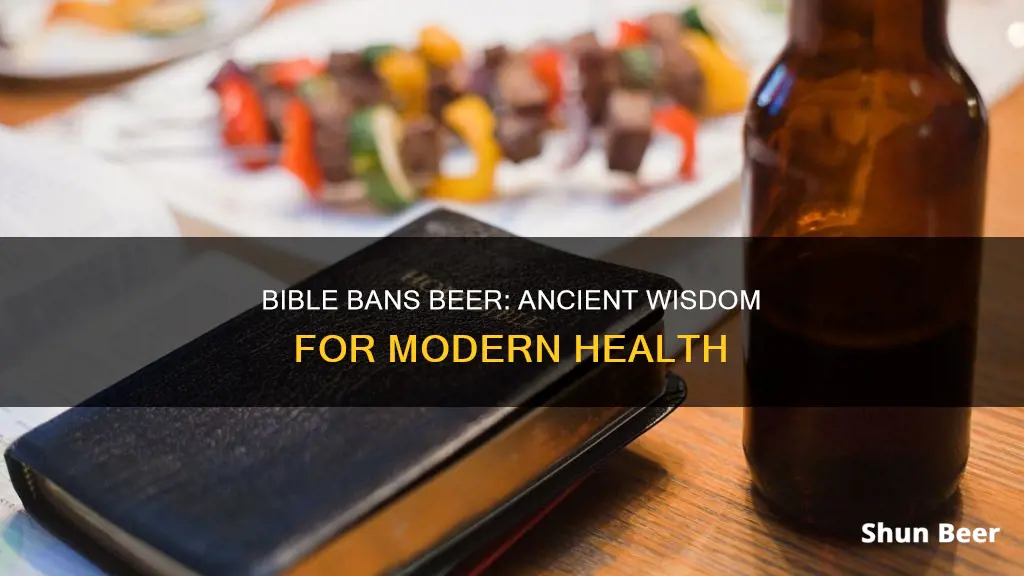
The Bible does not prohibit drinking beer, wine, or other alcoholic drinks. In fact, some passages in the Bible refer to alcohol in a positive light. For example, Ecclesiastes 9:7 instructs people to drink your wine with a merry heart, and Psalm 104:14-15 states that God gives wine that makes glad the heart of men. However, the Bible does caution against drunkenness, which is considered a sin. For instance, Ephesians 5:18 states, do not get drunk with wine, for that is debauchery, but be filled with the Spirit.
| Characteristics | Values |
|---|---|
| Alcohol consumption | Not forbidden, but Christians must avoid drunkenness and addiction |
| Drunkenness | Sinful |
| Drinking in excess | Addictive |
| Drinking in moderation | Recommended |
| Alcohol for medical reasons | Allowed |
| Alcohol for pain management | A blessing from God |
| Alcohol for relaxation | Allowed |
| Alcohol for enjoyment | Allowed |
| Alcohol and the gospel | Do not drink if it will hinder the gospel |
| Alcohol and fellow believers | Do not drink if it will offend fellow believers |
What You'll Learn

Drunkenness is sinful
While Scripture does not forbid Christians from drinking beer, wine, or any other alcoholic drink, drunkenness is considered a sin.
The Bible contains many warnings about the dangers of alcohol and drunkenness, urging moderation and vigilance to maintain spiritual and practical well-being. Drunkenness is associated with a loss of self-control and reckless behaviour, as described in Ephesians 5:18: "Do not get drunk on wine, which leads to debauchery."
The Bible also highlights the negative consequences of excessive drinking, including impaired judgment, vulnerability to sin, health and social issues, economic hardship, and strained relationships. For instance, Proverbs 31:4-5 advises rulers against drinking alcohol, as it can impair their judgment and lead them to forget the law and pervert justice.
The Apostle Paul, inspired by the Holy Spirit, clearly instructs believers not to be drunk, which is considered a sin. In 1 Corinthians 6:12, he advises, 'All things are lawful for me,' but not all things are helpful. 'All things are lawful for me,' but I will not be enslaved by anything." This underscores the importance of self-control and not allowing oneself to be controlled by one's appetites.
Additionally, Christians are commanded not to allow their bodies to be "mastered" by anything (1 Corinthians 6:12; 2 Peter 2:19). Drunkenness and addiction to alcohol are sins that Christians must absolutely refrain from (Ephesians 5:18; 1 Corinthians 6:12).
In light of these teachings, Christians are encouraged to be filled with the Holy Spirit instead of indulging in excessive alcohol consumption.
Beer and Lovenox: Is It Safe to Mix?
You may want to see also

Alcohol is acceptable in small quantities
Alcohol is not inherently sinful, and the Bible alludes to its use. In fact, some Biblical passages discuss alcohol in positive terms. Ecclesiastes 9:7 instructs: "Drink your wine with a merry heart". Similarly, Psalm 104:14-15 states that God gives wine "that makes glad the heart of men".
However, the Bible also contains warnings against drunkenness and excessive drinking. Drunkenness is sinful and can lead people to hell. Christians can drink beer, but only in moderation. The Bible also warns against drinking alcohol to excess, as it can be addictive and lead to evil deeds.
The Bible also advises Christians to be mindful of how their actions may influence others. Drinking alcohol is acceptable, but only if it is done in a way that does not cause others to stumble or sin.
In conclusion, while alcohol is acceptable in small quantities, Christians must be careful not to abuse it and always act with responsibility and moderation.
Beer and Pregnancy: Is One Drink Safe?
You may want to see also

Drinking is acceptable for medical reasons
While the Bible does not forbid drinking alcohol, it does caution against drunkenness and overindulgence. However, there are instances where drinking is acceptable, and even encouraged, for medical reasons.
The Bible acknowledges the medicinal value of wine. In 1 Timothy 5:23, Paul instructed Timothy to stop drinking water exclusively and instead, drink wine for the sake of his stomach and frequent illnesses. In ancient times, water was often filled with bacteria, viruses, and contaminants, so wine was considered safer to drink.
The Bible also mentions wine as having the ability to gladden the human heart and make the face shine (Psalm 104:14-15). It is described as a gift from God that can make life more enjoyable (Ecclesiastes 9:7).
While Christians are warned against drinking to excess, drinking in moderation for medicinal purposes is acceptable. As the Bible states, "No longer drink water exclusively, but use a little wine for the sake of your stomach and your frequent ailments" (1 Timothy 5:23).
Additionally, Jesus himself drank wine during his time on earth (Matthew 26:29; Luke 7:34). He also turned water into wine at a marriage feast, which is considered one of his well-known miracles (John 2:1-10).
In conclusion, while drunkenness is considered a sin in the Bible, drinking in moderation for medical reasons, such as improving health or lifting spirits, is acceptable. Christians are encouraged to make their own informed decisions regarding alcohol consumption, always being mindful of their own limits and the well-being of others.
Beer Drinking: Weight Loss or Gain?
You may want to see also

Drinking is acceptable for enjoyment
Drinking in moderation is acceptable for enjoyment, according to the Bible. While Christians are called to live differently from the rest of the world, and to be like Jesus Christ, walking in the ways of righteousness and holiness, this does not mean that drinking is entirely off the table.
The Bible does not forbid drinking alcohol, and in fact, includes many references to wine and alcohol. Jesus' first miracle was turning water into wine, and Paul encouraged Timothy to drink wine for medicinal purposes. Ecclesiastes 9:7 instructs: "Drink your wine with a merry heart", and Psalm 104:14-15 states that God gives wine "that gladdens the human heart".
However, drunkenness is sinful, and Christians must be careful not to fall into this trap. Alcohol can lead to sinful behaviour, clouding judgement and lowering inhibitions. It is important for Christians to be filled with the Spirit, and guided by God, rather than by substances created by man.
The Bible also warns against drinking if it will offend other Christians, or encourage them to sin against their conscience. It is also not acceptable to drink if it will hinder the gospel, or if it will cause another Christian to stumble and fall into drunkenness or sin.
In summary, while drinking in moderation for enjoyment is acceptable, Christians must be vigilant not to fall into the trap of drunkenness, and always act in a way that honours God.
Drinking Beer on London Streets: What's the Law?
You may want to see also

Drinking is forbidden if it offends fellow believers
The Bible does not forbid Christians from drinking alcohol, but it does set out guidelines for its consumption. While drinking is not a sin, drunkenness is.
The Bible also instructs Christians to be considerate of their fellow believers. If drinking alcohol offends another Christian, it is forbidden.
> "If your brother is distressed because of what you eat, you are no longer acting in love. Do not by your eating destroy your brother for whom Christ died. 'For the kingdom of God is not a matter of eating and drinking, but of righteousness, peace, and joy in the Holy Spirit...Let us, therefore, make every effort to do what leads to peace and to mutual edification....It is better not to eat meat or drink wine or to do anything else that will cause your brother to fall.'" (Romans 14:15-21)
The Apostle Paul also advises Christians to be mindful of their actions and how they may affect others:
> "So whether you eat or drink, or whatever you do, do it all for the glory of God." (1 Corinthians 10:31)
> "Be careful, then, that the exercise of your rights does not become a stumbling block to the weak." (1 Corinthians 8:9)
In light of these passages, Christians are encouraged to consider how their actions may cause others to stumble in their faith. If drinking alcohol offends another believer, it is better to abstain.
Additionally, Christians are instructed to be considerate of those with differing convictions:
> "One person believes he may eat anything, while the weak person eats only vegetables. One person believes in letting one day pass before another day can be celebrated; another person makes every day the same. Each of them should be fully convinced in their own mind. Whoever regards one day as special does so to the Lord. Whoever eats meat does so to the Lord, for they give thanks to God; and whoever abstains does so to the Lord and gives thanks to God." (Romans 14:2-6)
Here, the Bible acknowledges that Christians will have differing views and practices. It encourages mutual respect and understanding, urging believers to act in a way that does not cause division or distress.
In conclusion, while the Bible does not prohibit alcohol consumption, it emphasizes the importance of moderation and respect for others. If drinking alcohol offends a fellow believer, Christians are instructed to abstain for the sake of peace and unity within the body of Christ.
Keto and Diet Root Beer: Is It Allowed?
You may want to see also
Frequently asked questions
No, drinking beer is not a sin. However, drunkenness is a sin. Christians can drink beer, but only in moderation.
The Bible does not forbid Christians from drinking beer. In fact, some passages discuss alcohol in a positive light. For example, Ecclesiastes 9:7 instructs: "Drink your wine with a merry heart."
No, the Bible never says that alcohol is always wrong. There are some situations in which the Bible forbids alcohol, but it is not universally prohibited.
The Bible allows Christians to drink alcohol for medical reasons. For example, Paul told Timothy: "Stop drinking only water and use a little wine because of your stomach and your frequent illness."







